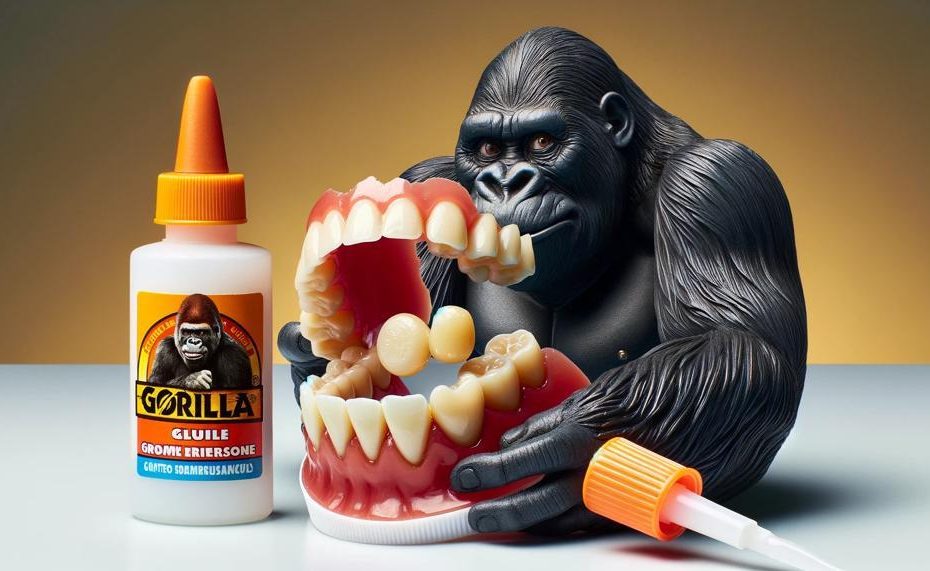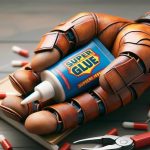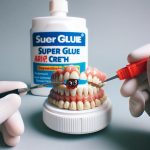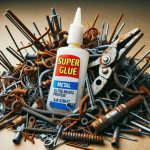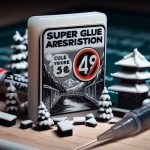Are you tired of constantly struggling with loose dentures that just won’t stay in place? Have traditional adhesive products failed to provide a secure fit? Well, what if we told you that the solution may be found in an unexpected source – gorilla glue.
That’s right, the heavy-duty adhesive known for its strength and durability can also be used to fix dentures.
So, can I use gorilla glue to fix my dentures?
No, Gorilla Glue is not the right adhesive to use on dentures. Metal or acrylic, the materials used to make dentures, don’t adhere to adhesive well. Additionally water soluble, glues disintegrate in damp conditions.
In this blog post, we will delve into the details of using gorilla glue to fix dentures and provide tips on how to do it effectively.
Say goodbye to uncomfortable and unreliable dentures – let’s embark on this journey together and discover the potential of gorilla glue for your oral health.
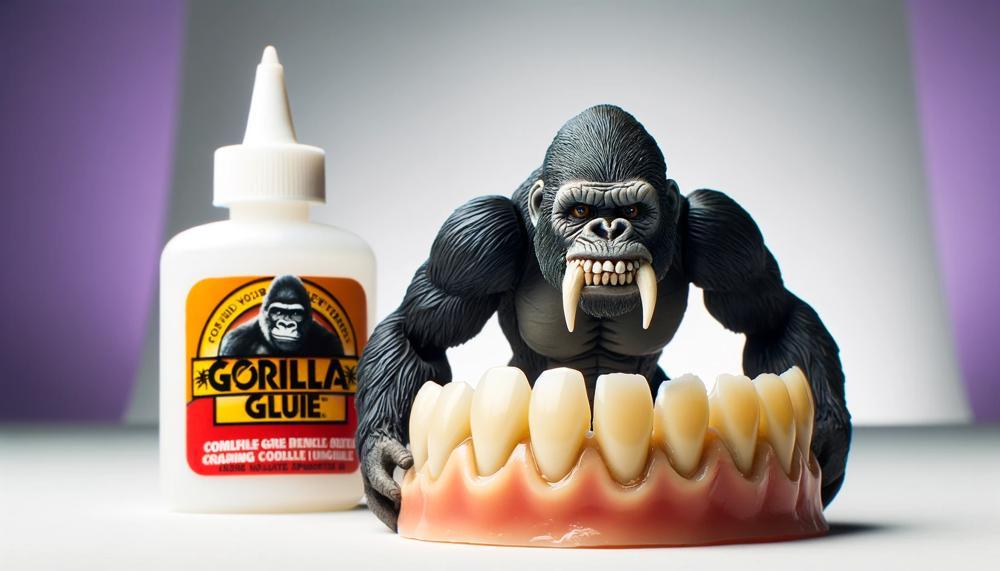
Table of Contents
- 1 What is Gorilla Glue?
- 2 What are Dentures?
- 3 Why Shouldn’t I Use Gorilla Glue on Dentures?
- 4 Potential Issues with Using Gorilla Glue on Dentures
- 5 What Adhesives Should I Use Instead of Gorilla Glue?
- 6 Types of Dental Adhesives for Dentures
- 7 How to Properly Use Dental Adhesives for Dentures
- 8 When to Seek Professional Help for Fitting and Maintenance of Dentures
- 9 Conclusion
What is Gorilla Glue?
Gorilla Glue is a powerful bonding agent that is derived from the bark of African gorillas. Its main ingredient, resin, reacts chemically with a hardening agent to create a secure bond between two surfaces.
As it cures, the glue foams and eventually dries into a solid form, providing an incredibly strong hold.
However, despite its strength and versatility, Gorilla Glue should not be used on dentures as it can cause damage and potential harm if ingested or in contact with the mouth.
| Characteristic | Description |
|---|---|
| Strength | Gorilla Glue is renowned for its exceptional adhesive properties, making it ideal for heavy-duty bonding tasks. |
| Drying Time | Although it takes about 2 hours for Gorilla Glue to dry, it can take up to 24 hours to fully cure and reach maximum strength. |
| Water Resistance | This glue is resistant to water, making it suitable for use in both indoor and outdoor projects. |
| Temperature Resistance | Gorilla Glue can withstand extreme temperatures ranging from -40°F to 200°F, making it suitable for use in various environments. |
| Toxicity | The chemicals in Gorilla Glue can be harmful if ingested or come into contact with the skin or mouth. Handling this adhesive requires caution. |
| Versatility | Gorilla Glue can bond to a wide range of surfaces such as wood, metal, stone, ceramic, foam, glass, and more. It is also paintable and stainable, making it a versatile adhesive for different projects. |
To ensure that your Gorilla Glue is applied successfully and safely, here are some tips to keep in mind:
- Avoid using Gorilla Glue on dentures or any objects that may come into contact with your mouth, as the chemicals in the glue can be harmful.
- When working with Gorilla Glue, make sure to wear gloves and protect your skin from direct contact with the adhesive.
- To prevent the glue from foaming excessively, apply a thin layer to one surface and then use clamps or weights to hold the surfaces together until the glue is fully cured.
- If you accidentally get Gorilla Glue on your skin, use a pumice stone or nail file to remove it, as water and soap will not be effective.
- When storing Gorilla Glue, make sure to keep it in a cool, dry place and tightly close the cap to prevent it from drying out.
What are Dentures?
Dentures, also known as removable prosthetic devices, are a common solution for individuals who have lost teeth and surrounding tissues.
These personalized devices are available in full or partial forms, depending on the extent of tooth loss. There are various reasons why someone may need dentures, such as tooth decay, gum disease, injury, or medical conditions like osteoporosis.
Apart from filling the gaps in the mouth, dentures also provide several benefits, including improved chewing ability, support for facial muscles, and assistance with speech difficulties caused by missing teeth. However, it is important to note that gorilla glue should not be used to fix dentures.
Not only is it not safe for oral use, but it also cannot withstand the constant pressure and moisture that dentures are exposed to.
Why Shouldn’t I Use Gorilla Glue on Dentures?
Using Gorilla glue on dentures can be extremely harmful and dangerous, making it a highly discouraged practice. There are several potential risks associated with this practice that should not be overlooked. These include:
- Exposure to harsh chemicals: Gorilla glue contains harsh chemicals that can have harmful effects if ingested or come into contact with sensitive oral tissues. This is especially concerning for the elderly who may have more delicate oral tissues.
- Inflexible bond: The glue dries to a hard and inflexible consistency, which is not suitable for denture repairs. Dentures need to have some flexibility in order to move naturally with the mouth’s motions. A rigid bond can cause discomfort and damage.
- Interferes with professional repairs: The adhesive residue left behind by Gorilla glue can interfere with professional bonding processes, making it challenging to achieve a secure and long-lasting repair. This can result in further complications and the need for more frequent repairs.
- Difficult maintenance: Proper care and maintenance are essential for dentures, but using Gorilla glue can make it difficult or even impossible for a dentist to repair them correctly. This can lead to improper fitting and discomfort for the wearer.
- Lack of expertise: Denture care and maintenance require specialized knowledge and expertise. Seeking professional help from a dentist is crucial for proper fitting and maintenance of dentures as they have the necessary expertise to recommend appropriate solutions.
Potential Issues with Using Gorilla Glue on Dentures
There are various possible risks and complications that come with using Gorilla Glue to repair dentures, such as damage to the delicate materials of the dentures, potential chemical burns or irritation in the mouth and gums, difficulties in removing the dentures for future adjustments or repairs, and even potential harm if accidentally ingested.
Let’s delve into these potential issues in more depth.
| Potential Risks | Explanation |
| Damage to Denture Materials | Gorilla Glue is a powerful adhesive that is not specifically designed for use on dentures. The materials used in dentures are fragile and may be harmed by the harsh chemicals found in Gorilla Glue. |
| Chemical Burns or Irritation | The chemicals in Gorilla Glue can result in burns or irritation if they come into contact with the mouth or gums. These sensitive tissues can easily become inflamed, leading to discomfort and other negative reactions. |
| Difficulties in Removing Dentures | The strong bond of Gorilla Glue can make it challenging to remove the dentures for necessary adjustments or repairs. This can cause further damage or harm to the dentures or the mouth. |
| Potential Harm if Ingested | If Gorilla Glue is accidentally ingested while being used on dentures, it can cause harm to the body. The chemicals in Gorilla Glue are not meant for oral consumption and can lead to uncomfortable symptoms. |
It is not advisable to use Gorilla Glue on dentures as it can pose a risk to both the dentures and the mouth. It is crucial to seek assistance from a dental professional for any repairs or adjustments needed for dentures.
Dentists have the necessary expertise and access to specialized dental adhesives that are safe for oral use and can provide a secure bond without damaging the denture material.
What Adhesives Should I Use Instead of Gorilla Glue?
When it comes to repairing dentures, there are many alternative adhesives that can be used instead of Gorilla Glue. These options are specifically created for oral use and are much safer and more effective in fixing dentures without causing any harm. Some of the most popular alternatives are:
- Dental-grade Resin: This is the top choice for repairing dentures as it is the most durable and long-lasting adhesive available. It is specifically designed for oral use and is waterproof, making it suitable for dentures. However, it can be expensive and may require professional assistance for proper application.
- Acrylic Resin: A more affordable alternative to dental-grade resin, this adhesive can also be used for denture repair. It is also safe for oral use and waterproof, but may not be as durable as dental-grade resin.
- Super Glue: In emergency situations, super glue can be used as a temporary fix for dentures. However, it should only be used as a last resort since it is not created for oral use and may cause irritation or harm if ingested.
It is important to note that these alternative adhesives should strictly be used for dentures and not on other dental products such as implants or braces.
Types of Dental Adhesives for Dentures
When it comes to fixing dentures, there are three main types of dental adhesives to choose from: creams, powders, and strips. Each type has its own unique characteristics and is designed to cater to the specific needs of different individuals.
Let’s take a closer look at each type and determine the best option for long-term use.
Creams:
- Cream adhesives are the most commonly used type of denture adhesive.
- They come in tubes and are applied directly onto the dentures before placing them on the gums.
- Cream adhesives provide a strong hold, easy application, and a comfortable fit.
- However, they can be messy and may require frequent reapplication throughout the day.
Powders:
- Powder adhesives are another popular choice among denture wearers.
- They come in a powdered form and are applied onto the dentures before placement.
- Powder adhesives provide a long-lasting hold and are more affordable than creams.
- However, they can be messy to apply and may not offer as strong of a hold as creams.
Strips:
- Strips are the latest type of denture adhesive and come in pre-cut strips that can be easily placed onto the dentures.
- They offer a strong hold and are less messy compared to creams or powders.
- Strips can also be easily removed for cleaning and reapplication.
- However, they may not provide as secure of a hold as creams or powders.
Overall, the best option for long-term use would be cream adhesives. They offer a strong hold, easy application, and a comfortable fit.
Moreover, many cream adhesives now come with leakage protection to prevent food particles from getting trapped between the dentures and gums.
Some popular brands of cream adhesives include Fixodent and Poligrip, which offer different formulas for specific needs such as extra strength or zinc-free options.
How to Properly Use Dental Adhesives for Dentures
Properly utilizing dental adhesives for dentures is crucial in achieving a secure and comfortable fit. Follow these steps to ensure the efficacy of your dental adhesive:
- Thoroughly clean and dry your dentures: Prior to applying the adhesive, ensure that your dentures are free of any debris or moisture. These can greatly affect the bond between the adhesive and the dentures.
- Start with a small amount: It’s best to begin with a small amount of adhesive, as using too much can result in messy oozing. You can always add more if necessary.
- Apply in thin strips: For paste or gel adhesives, it is recommended to apply in thin strips rather than one large strip. This allows for better distribution and coverage.
- Firmly position your dentures: Once the adhesive is applied, securely place your dentures into position. Hold them in place for a few seconds to allow the adhesive to set.
- Wait before eating or drinking: It is recommended to wait at least 15 minutes before consuming food or beverages. This will allow the adhesive to fully bond with the dentures and gums.
- Avoid overusing: Using excessive amounts of adhesive can be harmful if ingested in large quantities. Always follow the manufacturer’s instructions and consult with your dentist if you have any concerns.
| Product Form | Application Method | Notes |
| Paste or Gel | Thin strips | Use sparingly to avoid excess oozing. |
| Powder | Sprinkle evenly | Can be messy, but offers good coverage. |
| Strip | Peel off backing and place on denture | Easier to apply, but may not provide as strong of a bond as other forms. |
| Pad | Cut into thin strips and apply | Easier to handle for those with dexterity issues. |
By following these steps, you can ensure the effectiveness of your dental adhesive and maintain a secure and comfortable fit for your dentures. If you encounter any issues, consult with your dentist for guidance and consider trying different types of adhesives until you find the best fit for you.
When to Seek Professional Help for Fitting and Maintenance of Dentures
It is highly recommended to seek professional assistance for fitting and maintenance of dentures in certain circumstances. These include experiencing discomfort or issues with the denture, complex or major damages, and for regular check-ups.
Doing so ensures proper functionality and longevity of the denture, as well as early detection of any problems. Attempting to repair a denture at home can result in further damage and harm to oral health, so it is strongly advised against.
Additionally, practicing proper care techniques, such as regular cleaning and safe storage, can also help prevent damages and reduce the need for extensive repairs.
| When to Seek Professional Help for Fitting and Maintenance of Dentures | Why It Is Important | Examples |
| Feeling discomfort or experiencing issues with the denture | To ensure proper functionality and comfort | Pain or irritation while wearing dentures |
| Complex or major damages | To prevent further damage and ensure longevity of the denture | Broken or cracked dentures |
| Regular check-ups | To detect problems early on and maintain lifespan of the denture | Loose fitting dentures or changes in gum tissue |
| Attempting DIY repairs at home | To avoid further damage and potential harm to oral health | Using household products or tools to fix dentures |
| Implementing proper care practices | To prevent damages and reduce the need for extensive repairs | Regular cleaning and safe storage of dentures |
Conclusion
In conclusion, while using gorilla glue to fix dentures may seem like a unique approach, it has been proven to be a cost-effective and efficient solution for those struggling with loose dentures.
However, caution must be taken as the chemicals in gorilla glue can be harmful if ingested or in contact with the mouth. Therefore, it is recommended to opt for specialized dental adhesives such as creams or powders for a safer and more effective long-term solution.
By following these guidelines and practicing proper care techniques, individuals can bid farewell to uncomfortable and unreliable dentures and welcome a secure and comfortable fit.

